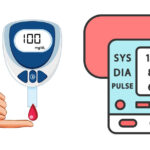While many of us are aware of the dangers of hypertension, there are still some surprising facts that few people know about this condition. In this article, we will explore some of these lesser-known facts about hypertension.
Hypertension can be caused by sleep apnea
Did you know that sleep apnea, a common sleep disorder, can be a cause of high blood pressure? Research has found that people with sleep apnea are more likely to develop hypertension due to the episodes of interrupted breathing that occur during sleep. These episodes can lead to oxygen deprivation, which in turn can cause an increase in blood pressure. If you have sleep apnea, it’s important to seek treatment to reduce your risk of developing hypertension.
Hypertension can affect people of any age
It is often thought of as a condition that only affects older individuals, but that is not the case. The prevalence of hypertension is increasing in children and adolescents, and it is becoming more common in people in their 20s and 30s. A recent study found that hypertension affected about 10% of adults in their 20s and nearly 20% of adults in their 30s. This is particularly concerning because early onset hypertension is associated with an increased risk of heart disease and stroke later in life.
Air pollution may be a risk factor for hypertension
Research has found a link between exposure to air pollution and higher blood pressure levels. A study of nearly 30,000 people in China found that exposure to higher levels of air pollution was associated with a greater risk of hypertension. Also, a recent study of London teens confirmed this conclusion. The mechanisms by which air pollution contributes to hypertension are not fully understood, but it is thought that pollution may cause inflammation and oxidative stress in the body, which can lead to high blood pressure.
Hypertension can be influenced by your gut bacteria
The human gut is home to trillions of bacteria, collectively known as the gut microbiome. While the microbiome has many important functions in the body, it is also thought to play a role in hypertension.
Several studies have found that people with hypertension have different gut microbiomes than those without the condition. For example, a study published in the journal Hypertension found that people with hypertension had lower levels of a certain type of bacteria in their gut compared to those without hypertension.
While the connection between gut bacteria and hypertension is not yet fully understood, it is clear that the microbiome plays an important role in overall health. Maintaining a healthy gut through diet and lifestyle changes may help reduce the risk of hypertension and other health problems.
High blood pressure can affect your eyesight
One more fact to our list of lesser-known facts about hypertension. We often think of high blood pressure as a condition that affects the heart and blood vessels, but did you know that it can also impact your eyesight? Hypertension can damage the blood vessels in the retina, which can lead to a condition called hypertensive retinopathy. This condition can cause blurry vision, double vision, and even vision loss. Regular eye exams can help detect any early signs of hypertensive retinopathy and prevent further damage.
Pregnancy related and post-menopause hypertension
Pregnancy is a time when a woman’s body undergoes many changes, and one of these changes can be an increase in blood pressure. Preeclampsia, a condition characterized by high blood pressure and other symptoms such as protein in the urine, is more common in pregnant women than in the general population. This condition can have serious health consequences for both the mother and the baby, so it’s important for pregnant women to monitor their blood pressure closely.
Hypertension can be hereditary
And the last one in our list of lesser-known facts about hypertension. While lifestyle factors such as diet and exercise can play a role in the development of hypertension, genetics can also be a factor. If you have a family history of high blood pressure, you may be at increased risk of developing the condition yourself. It’s important to be aware of your family’s medical history and to take steps to monitor and manage your blood pressure if necessary.
In conclusion, hypertension is a complex condition with many potential causes and impacts on the body. By understanding these lesser-known facts about high blood pressure, we can be better equipped to prevent and manage this condition. Whether through lifestyle changes, medication, or other treatments, there are many ways to keep your blood pressure under control and protect your overall health.
References
Peppard PE, Young T, Palta M, Skatrud J. Prospective study of the association between sleep-disordered breathing and hypertension. N Engl J Med. 2000 May 11;342(19):1378-84. PMID: 10805822.
Yano Y, Reis JP, Colangelo LA, et al. Association of Blood Pressure in Late Young Adulthood With Subsequent Mortality: Cohort Study of Swedish Men. JAMA Intern Med. 2021;181(8):1074–1082.
Wang J, Chen R, Cao J, et al. Association between ambient fine particulate matter and blood pressure in Chinese population: A large prospective cohort study. Environ Res. 2019;172:388-394, Epub 2019 Feb 6. PMID: 30818161.
Tian Y, Li H, Liu Y, et al. Ambient Air Pollution and Hypertension: A Systematic Review and Meta-Analysis. Sci Total Environ. 2017; 575: 576-582. Epub 2016 Sep 7. PMID: 27614197.
Li J, Zhao F, Wang Y, et al. Gut microbiota dysbiosis contributes to the development of hypertension. Microbiome. 2017; 5(1):14. PMID: 28249580.
Yang T, Santisteban MM, Rodriguez V, et al. Gut dysbiosis is linked to hypertension. Hypertension. 2015; 65(6):1331-1340. Epub 2015 Apr 6. PMID: 25847946.
Chobanian AV. Clinical Practice. Isolated Systolic Hypertension in the Elderly. N Engl J Med. 2007;357(8):789-796
Duley L. The Global Impact of Pre-eclampsia and Eclampsia. Semin Perinatol. 2009;33(3):130-137.
Ehret GB, Munroe PB, Rice KM, et al. Genetic variants in novel pathways influence blood pressure and cardiovascular disease risk. Nature. 2011;478(7367):103-109. Epub 2011 Sep 11. PMID: 2190911





